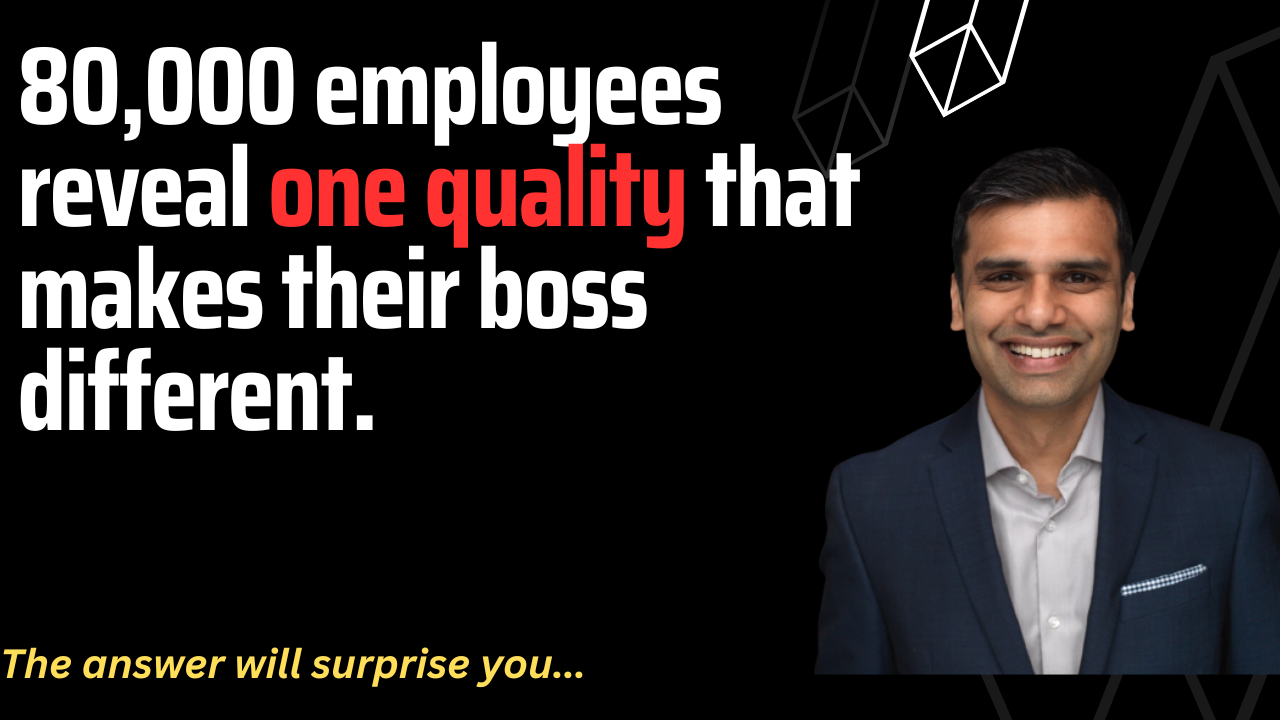80,000 employees reveal one quality that makes their boss different

I was doing research for my upcoming book and came across a survey you need to see.
80,000 employees were asked, “What makes your manager different from other managers at your organization?”
The most popular answer wasn’t about trust, experience, or intelligence.
It was far simpler than that.
It was: "My manager makes me feel valued."
Surprised? Don't be.
There's enough research showing that employees are looking for more positive feedback.
A study in 2016 shows 82% of employees felt they weren't getting enough recognition from their managers.
So the question is, how can you make sure your employees aren't feeling neglected?
The easy answer is to give them positive feedback, right?
But what If I told you even well-intentioned positive feedback can sometimes backfire and turn off your employees?
If you truly want to win the hearts and minds of your employees, you need to master the art of giving impactful positive feedback. I call this "Rich Recognition."
Rich recognition has one goal: to specifically highlight the behavior your employee is excelling at so they continue doing it.
Rich recognition has three key qualities:
- Specific
- Sincere
- Timely
Rich recognition is specific
Imagine you give a great presentation to a demanding client. It’s been a couple of days since your presentation and your manager hasn’t said a word. A week later during your 1:1, your manager says:
“Nice job on the presentation last week.”
Now imagine the same scenario. But this time your manager calls you right after the presentation and says:
“You crushed the presentation today! Here’s what I specifically loved about what you did today. Instead of using slides to show screenshots, you logged into the clients account. You went the extra mile to tailor the presentation to their needs. I also appreciated how you shared a story from a similar client to bring your point home. Great job on the presentation today. I appreciate how hard you’ve been working on nailing this presentation. Thank you!”
Notice the difference? I bet you do!
The first example isn’t bad, but truth be told, it can come across as an afterthought. The second example is specific, thoughtful, and memorable.
Rich recognition is sincere
The opposite of rich recognition is insincere praise. At first glance, it may seem perfectly fine. But if you look closer, you'll start to notice some glaring issues. Here are two common examples of insincere praise:
"Mary, you did such a great job on the presentation. Could you also take care of this?"
On the surface there’s nothing wrong with this positive feedback. However if positive feedback is only or mostly given to get something back in return, then it quickly loses its meaning.
Another example of insincere feedback is the ‘feedback sandwich’. Most of us have either served or been served this sandwich. This is where the manager sandwiches constructive feedback between two layers of positive feedback to soften the blow.
"Rob, you did a great job on that report, but there were a few errors in the data that need to be fixed. Overall, really good work!”
At first glance, this seems like a decent way to give feedback. But over time, employees may start to tune out the positive parts, assuming that any praise is just a lead-in to criticism. This can make the feedback feel disingenuous and confusing.
Whenever possible try to give praise and constructive feedback separately. If Rob did great work, acknowledge it. If there are mistakes, address them directly. Keeping them separate makes both feel more meaningful.
Rich recognition is timely
This reminds me of a story I shared with you last November. The COO of Pepsi was in a meeting with his route sales team trying to solve a problem.
The name ‘Bob’ kept popping up.
- “You should ask Bob”
- "Bob showed me this."
- "Bob helped me with that."
The COO looked over at Bob, a route salesperson himself. Bob was in the corner with tears running down his face.
"Bob, people are heaping all this praise on you. Why are you so upset?"
Bob replied:
"I've been at the company for 47 years. I'm about to retire in a couple of weeks. And I never knew anybody felt this way about me."
Life is short. Don’t wait to recognize your people. If you see something good, say something good. And when you say something good, make it sincere and specific.
Lead Today. Not Someday
Over 2,700 leaders read this newsletter weekly.
We hate SPAM. We will never sell your information, for any reason.
